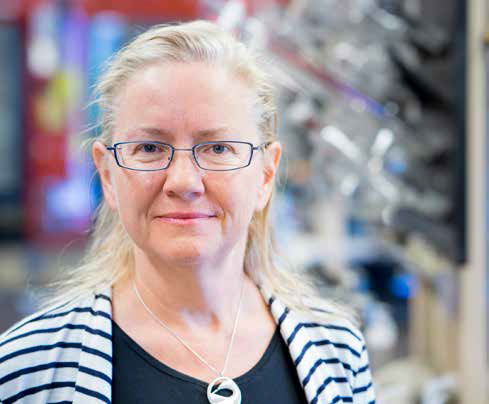Jean Chmielewski - 2017 Herbert Newby McCoy Award

Jean Chmielewski – 2017 Herbert Newby McCoy Award
Jean Chmielewski is the Alice Watson Kramer Distinguished Professor of Chemistry at Purdue University. She is a professor of biomedical engineering.
She earned her Bachelor of Chemistry degree from St. Joseph's University in Philadelphia and earned her PhD in organic chemistry from Columbia University. After postdoctoral fellowships at Rockefeller University and the University of California, Berkeley, she joined Purdue as an assistant professor in 1990 and received a distinguished professorship in 2005.
Her research interests are in chemical biology and bioorganic chemistry, including work in the design of agents to modulate protein-protein interactions, the development of agents that target intracellular pathogenic bacteria, novel agents to eradicate HIV reservoirs and peptide-based biomaterials for regenerative medicine.
Chmielewski has received recognition for her research and teaching, including a National Institutes of Health First Award, a National Science Foundation National Young Investigator Award, an Alfred P. Sloan Award, an Arthur C. Cope Scholar Award and an Edward Leete Award from the American Chemical Society. She also has received several teaching awards, including the Charles B. Murphy Award — Purdue's highest teaching award. She is a fellow of the American Association for the Advancement of Science.
Designing Unique Chemical Approaches to Solve Significant Issues in Human Health
Abstract
Molecular strategies will be presented to target and kill pathogenic bacteria residing within human cells and to promote the penetration of antiviral agents across the blood-brain barrier with the goal of eradicating HIV reservoirs. Her talk will focus on designing chemical approaches and therapeutics to solve significant issues in human health and disease. Her presentation will provide insights into two different areas of chemical biology:
- The development of agents that target intracellular pathogenic bacteria.
- The design of molecules to promote the penetration of anti-HIV agents across the blood-brain barrier.
Research Accomplishments
Professor Chmielewski has forged an interdisciplinary research program to address fundamentally important problems at the intersection of chemistry, biology and medicine. She focuses her research on four interrelated areas:
- Modulating protein assembly.
- Inhibiting drug resistance efflux transporters.
- Targeting intracellular pathogenic bacteria.
- Bionanotechnology.
In the early 1990s, Chmielewski was one of the first researchers to develop agents that modulate protein-protein interactions, revealing their potential to serve as therapeutic targets. Her publications, using cross-linked peptide fragments that mimic protein interfaces, were among the first in this field of drug discovery. Her research also led to potent protein-protein interaction inhibitors of anti-HIV targets, transcription factors and pore-forming proteins of pathogenic bacteria.
Over the past decade, Chmielewski has begun a program that blocks multidrug resistance transporters, which are major proteins limiting the anatomical and cellular accumulation of therapeutics for diseases such as cancer, HIV and malaria. Her research provides an innovative strategy to block both the efflux function of transporters and deliver the required therapy to the disease site. This unique project tackles a wide range of diseases with a single interdisciplinary platform technology, and it includes new strategies to limit the formation of HIV reservoirs in the brain and anti-malaria therapies that directly target resistance mechanisms.
Designing shuttles to bring therapeutic agents into cells has been another hallmark of Chmielewski's research over the past two decades. For example, she recently developed a novel class of biomimetic peptides, cationic amphiphilic polyproline helices, that efficiently enter cells and eradicate pathogenic bacteria at their specific subcellular site. This has provided agents that target and kill bacteria — including mycobacterium tuberculosis, salmonella and listeria — within human macrophages. These agents also are being pursued as novel preclinical drug candidates for treatment of complicated skin infections and hospital-acquired pneumonia.
Chmielewski has designed a hierarchical assembly of modified triple helical collagen and coiled-coil mimetic peptides for use in regenerative medicine. For example, collagen peptides with strategically placed metal binding sites have led to an array of higher-order structures, with unique cell-binding capabilities and controlled protein release. These biocompatible materials have potential for use in tissue engineering and regenerative medicine, which she has demonstrated with recent work in her laboratories on stem cell differentiation and scaffold-mediated cell assembly. These assemblies also have been used to bind histidine-tagged cargoes in drug delivery.

